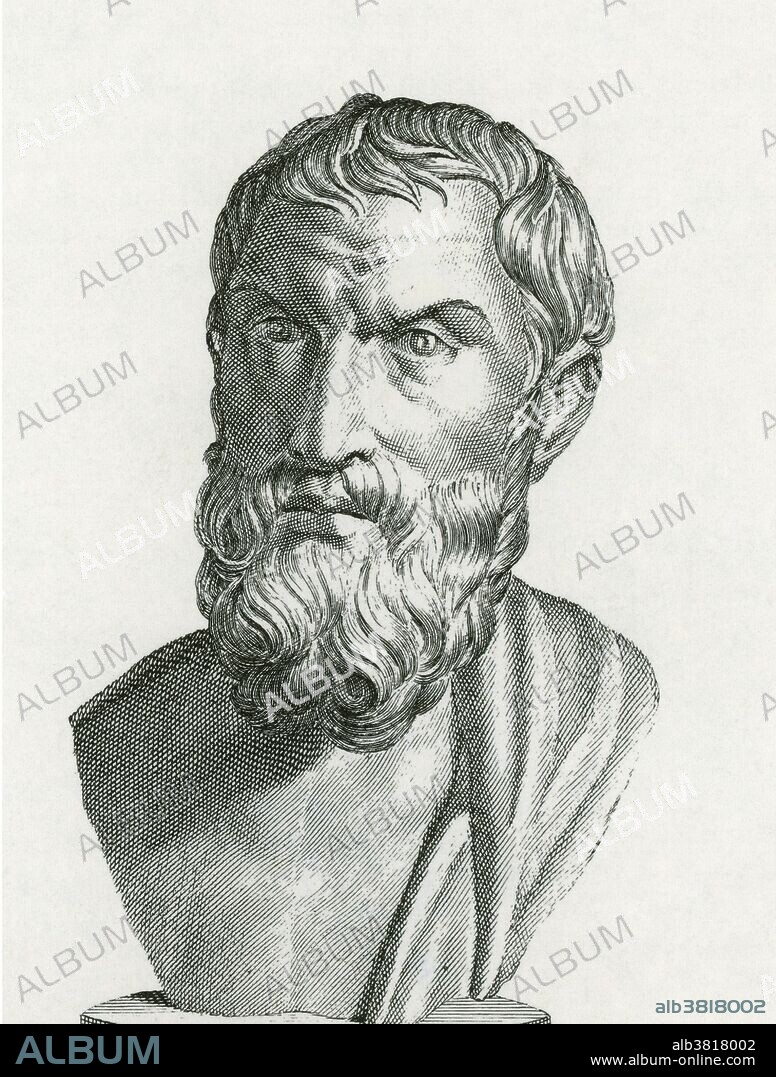alb3818002
Epicurus, Greek Philosopher

|
Añadir a otro lightbox |
|
Añadir a otro lightbox |



¿Ya tienes cuenta? Iniciar sesión
¿No tienes cuenta? Regístrate
Compra esta imagen

Título:
Epicurus, Greek Philosopher
Descripción:
Traducción automática: Grabado de una estatua del pequeño busto de Epicuro, en bronce. La estatua se encuentra en los volúmenes de Herculano de 1793 a 1809. Epicuro (341 - 270 a. C.) fue un filósofo griego antiguo y fundador de la escuela de filosofía llamada epicureísmo. De sus 300 obras escritas sólo quedan algunos fragmentos y cartas. Gran parte de lo que se sabe sobre la filosofía epicúrea deriva de seguidores y comentaristas posteriores. Para Epicuro, el propósito de la filosofía era lograr una vida feliz y tranquila, caracterizada por la ataraxia (paz y libertad del miedo) y la aponia (la ausencia de dolor) y por vivir una vida autosuficiente rodeado de amigos. Enseñó que el placer y el dolor son las medidas del bien y del mal; la muerte es el fin tanto del cuerpo como del alma y, por tanto, no debe temerse; los dioses ni premian ni castigan a los humanos; el universo es infinito y eterno; y los acontecimientos en el mundo se basan en última instancia en los movimientos e interacciones de los átomos que se mueven en el espacio vacío. Epicuro nunca se casó y no tuvo hijos conocidos. Sufría de cálculos renales, a los que finalmente sucumbió en el año 270 a.C. a la edad de 72 años.
Etching of a statue of the small bust of Epicurus, in bronze. The Statue is found in volumes of Herculaneum from 1793-1809. Epicurus (341 - 270 BC) was an ancient Greek philosopher as well as the founder of the school of philosophy called Epicureanism. Only a few fragments and letters of his 300 written works remain. Much of what is known about Epicurean philosophy derives from later followers and commentators. For Epicurus, the purpose of philosophy was to attain the happy, tranquil life, characterized by ataraxia (peace and freedom from fear) and aponia (the absence of pain) and by living a self-sufficient life surrounded by friends. He taught that pleasure and pain are the measures of what is good and evil; death is the end of both body and soul and should therefore not be feared; the gods neither reward nor punish humans; the universe is infinite and eternal; and events in the world are ultimately based on the motions and interactions of atoms moving in empty space. Epicurus never married and had no known children. He suffered from kidney stones, to which he finally succumbed in 270 BC at the age of 72.
Crédito:
Album / Science Source / New York Public Library
Autorizaciones:
Modelo: No - Propiedad: No
¿Preguntas relacionadas con los derechos?
¿Preguntas relacionadas con los derechos?
Tamaño imagen:
3144 x 4151 px | 37.3 MB
Tamaño impresión:
26.6 x 35.1 cm | 10.5 x 13.8 in (300 dpi)
Palabras clave:
3RD CENTURY B. C. • ANCIENT GREEK • ANTIGUO • ANTIGÜEDAD • ARTE • ATOMISMOS • BLANCO Y NEGRO • DIBUJO • EPICUREISMO • FAMOSA • FAMOSO • FIGURA • FILOSOFIA • FILOSOFO • GENTE • GRIEGO ANTIGUO • GRIEGO • HISTORIA • HISTORICO • HOMBRE • HOMBRES • ILUSTRACION • IMPORTANTE • MASCULINO • MATERIALISMO • OBRA DE ARTE • PERSONA • PERSONALIDAD • PERSONALIDADES • PORTRAIT • RETRATO DE HOMBRE • RETRATO • S. III AC • S. IV AC • SIGLO III A. C. • SIGLO III AC • SIGLO IV A. C. • SIGLO IV AC • SIGLO IV AC.
 Pinterest
Pinterest Twitter
Twitter Facebook
Facebook Copiar enlace
Copiar enlace Email
Email
